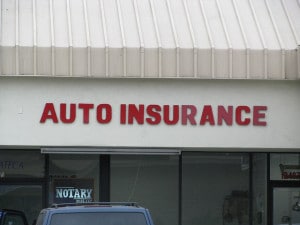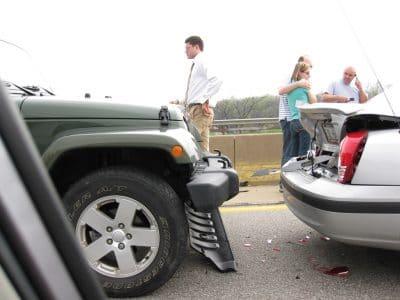Filing property damage claims after you have been in a car accident can be a serious hassle. It means working with insurance companies (a chore in itself) while also going through the long, inconvenient process of repairing what someone else damaged through their negligence. Knowing the process of filing a property damage claim will make the process easier for you and will provide peace of mind. The process of filing a property damage claim is different depending on who is at fault, but for the purpose of this post we will just focus on what to do if you are not at fault.
Table of Contents
1.) Exchange insurance information
It is vital for you to get the insurance information of the person who damaged your property. This includes writing down the following:
- the person’s name and contact information
- insurance provider
- policy number and insurance number
- time, location, and description of the accident
- the contact information of any available witnesses
2.) Call your insurance agent
Your insurance agent is available to help you file a property damage claim through the at-fault’s insurance. If you do not have an insurance agent, you can also call the at-fault insurance company and talk to a representative there. You will not have to worry about any expenses as long as the at-fault party admits responsibility. You will have to pay, however, if you do not know who caused the damage or if the person does not have adequate insurance coverage.
3.) Working with insurance companies
Working with insurance companies after a car accident can be a complicated and frustrating process. When a car is badly damaged, many insurance adjusters will consider it a “total loss” and begin the settlement process. Often, adjusters will try to settle on a replacement vehicle that the accident victim feels is an unfair substitute. If your car is damaged, but repairable, you have certain rights and privileges the adjuster might fail to mention.
Tips to remember
If you have been in an accident and are working with the insurance company, it is important to have proper knowledge of the situation to avoid an unfair settlement. The following tips could help ensure you receive a proper settlement:
- Insurance papers can be extremely technical and confusing. Before you sign any papers, make sure you fully understand the substance of the agreement. Also, do not be afraid to contact your insurance company and ask any questions you may have pertaining to the documents they want you to sign.
- You may have the right to a rental car. If you cannot drive your car after the accident, your insurance company or the at-fault driver’s insurance company can provide you with a rental car. They are obligated to provide a rental car that is the same size as the vehicle you were driving at the time of the accident. If you do not use a rental car for a period of time after the accident, you may be entitled to monetary compensation from the insurance company ranging from $15 to $25 dollars for each day you went without a rental car.
- Do not keep the rental car longer than the insurance company permits. You will be held responsible for additional charges. Return the car the moment the insurance company tells you to do so.
- Research the value of your car at the time of the accident. Use your local classifieds or websites such as ksl.com or autotrader.com. Browse the internet and contact local auto dealers to compare the year, make, model, and condition of your vehicle with other cars on the market. The insurance company will give greatest weight to the vehicles that are closest to the city in which you live. You are not required to accept the adjuster’s first settlement offer, especially if you think it is less valuable than your previous vehicle. If this happens, simply counter-offer with vehicles you have found in your own research. You can also ask the insurance company to provide documentation with details on how they valued the vehicle. Do not hesitate to request this information, as the insurance company is obligated to provide this information under Utah State law.
- Know your rights. Utah State law provides detailed rules and guidelines by which insurance companies must abide when handling property damage claims. These rules, established in the Utah Administrative Code, can provide you with necessary support as you work with the adjuster. The Code specifies which driver’s insurance company must provide a settlement, how the insurance company must value the property damage claim, and what rights you have to defend your claim. These rules are available here.
- Carefully consider whether you should have your own insurance handle the property damage. Even though the accident was not your fault, your own insurance company may offer to handle the property damage claim. This has pros and cons. Typically your own insurance company can handle the claim much faster than the at-fault driver’s insurance company. However, your own insurance company may require you to pay for medical treatment after the accident. Rest assured that once the at-fault driver’s insurance company accepts responsibility for the accident, they will reimburse your insurance company for the property damage claim and your deductible will be returned.
- Be aware that the insurance company may repair your vehicle with used parts. If your car was not new at the time of the accident, the insurance company has a right to repair the vehicle with used parts. However, the used parts must be comparable in quality and age. Even though the part is used, the repair shop will use a part from the same manufacturer, the same year, and of the same quality as the original part. Used parts come from a nationally based locating system and can arrive in 1-2 business days. On the other hand, new parts come from the manufacturer or dealerships and typically take weeks before they can be delivered.
- Many times throughout the repair process, the body shop will discover additional damage that was not initially approved by the insurance company. When this happens, the body shop will document the additional damage by taking photographs or asking the insurance adjuster to come to the body shop and inspect the damage. Unless the insurance company can prove that the additional damage is not accident-related, they will be obligated to repair it. If the insurance company refuses to repair the additional damage, you should take the car to other body shops and have them document—in writing—their opinion that the additional damage must be accident-related because it is not the type of damage that is normally cause by regular wear and tear.
- If you are unhappy with the repair work done on the vehicle, it is best to return to the original body shop and explain why you are unhappy. Most body shops will do everything in their power to make the customer happy. If the body shop refuses to address your concerns, take the vehicle to other local body shops and have them document what should have been done by the shop. You can then provide the insurance company with this information.
- You might be able to take the property damage claim to small claims court. While this may be an option, be extremely careful and consult with an attorney before pursuing this course of action, as it has the potential to completely wipe out your ability to make an injury claim if you were hurt in an accident!
4.) Hire an Attorney
Most property damage-only cases will not be taken by attorneys. In most cases, you will not need the help of an attorney to help you handle the claim. You may consider doing so, however, if there is significant personal injury involved in the accident where there is also property damage. Here at Good Guys Injury Law we offer free consultations and may consider your case. Call us today! 801-506-0800.
Additional source: About.com
Photo copyright to David Fulmer

